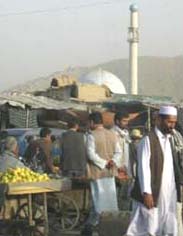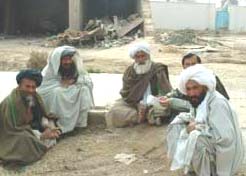| Maryland Newsline |
| Home Page |
Politics
|
American Muslims Reach Out
to Afghan Mosques
Maryland Newsline Thursday, March 31, 2005
Part of Maryam Khan's job in Afghanistan last year was to build barracks for the new Afghan army, including areas for cleansing rites and prayer. After five months under heavy U.S. security, Khan, an American, yearned for more contact with ordinary Afghans. When she returned home to Ellicott City, Md., last
October, she found she couldn't leave thoughts of them behind.
Since late January, more than 12 volunteers from five U.S. states have signed up to start gift drives at their local mosques. At least four Maryland mosques -- in Baltimore, College Park, Laurel and Gaithersburg -- are on the list, although none has sent packages overseas yet. Ifill, a Christian who says he's not active in a
church, has been in Afghanistan since September. Since deploying, he has
found himself scrambling for ways to connect with ordinary Afghans, whose
lives usually center around Islam, he said. Fahad Ashraf, president of the Muslim Students Association at the University
of Maryland, Baltimore, said his 30-member organization would send a package
to Afghanistan within the next two months.
With a goal of just one package per group, "it just seemed like a good,
small-scale project that we could easily get involved in," said Ashraf, a
third-year dentistry student.
Ifill and Khan say they have discussed security concerns with military superiors. They have also responded to worries of American Muslims who fear their gifts of goodwill may leave them vulnerable to suspicions of aiding terrorism. To avoid security breaches, Ifill and Khan say, packages will be sent through Ifill's military mailing address, which has the added advantages of being faster and cheaper than regular mail. Ifill will unpack all items, document them and "send them up higher" to military seniors before re-sealing and delivering the gifts, Khan said. "In other words, no package will come directly through the mail to the Afghan mosque or directly through the mail to the U.S. mosque," Khan wrote in a reassuring e-mail to potential volunteers. "It all will be a very controlled process." No electronics, cash or anything that could be used as a weapon will be allowed, Khan said. If Afghan mosques want, they can send loose items to Ifill in a similar gesture of goodwill. He will inspect and document them before mailing them to the United States. Donors won't know the identity of recipient mosques until after the gifts have been delivered, Khan said. Nor could Afghan mosques trace gifts back to individuals: Ifill will destroy identifying information and return addresses. Some volunteers are taken aback by the stringent security measures. "I didn't even think of it as a problem, to be honest," Ashraf said. Still, he said, he appreciates the safeguards. A State Department official who works
on Afghanistan affairs said the project would not be a security threat even
if held outside military channels. "There are all sorts of people-to-people
projects going on"
without government involvement, said the official, who asked not
to be named.
"We do not want anything in return,” the letter says. “We just want to send our warm wishes to you." It is signed simply, "With peace and love." Some see real cultural benefits to the project. "This idea will help people to understand that in the U.S., Muslims have their rights, they have their mosques, they are free to do everything about their religion," said Ghafoor Liwal, a former spokesman for the Constitutional Commission in Afghanistan who is on a Fulbright-funded fellowship at the University of Maryland, College Park. While most
educated people in Afghanistan know this, Liwal said, others will be
surprised. To learn more about the project, e-mail Maryam Khan at maryam@jhu.edu. Copyright © 2005 University of Maryland Philip Merrill College of Journalism
|



